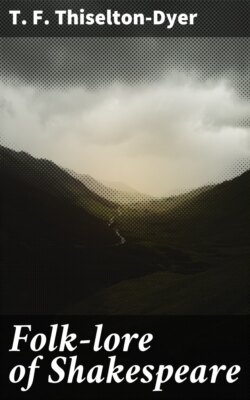Читать книгу Folk-lore of Shakespeare - T. F. Thiselton-Dyer - Страница 9
На сайте Литреса книга снята с продажи.
WITCHES.
ОглавлениеTable of Contents
In years gone by witchcraft was one of the grossest forms of superstition, and it would be difficult to estimate the extent of its influence in this and other countries. It is not surprising that Shakespeare should have made frequent allusions to this popular belief, considering how extensively it prevailed in the sixteenth and seventeenth centuries; the religious and dramatic literature of the period being full of it. Indeed, as Mr. Williams[46] points out, “what the vulgar superstition must have been may be easily conceived, when men of the greatest genius or learning credited the possibility, and not only a theoretical but possible occurrence, of these infernal phenomena.” Thus, Francis Bacon was “not able to get rid of the principles upon which the creed was based. Sir Edward Coke, his contemporary, the most acute lawyer of the age, ventured even to define the devil’s agents in witchcraft. Sir Thomas Browne and Sir Matthew Hale, in 1664, proved their faith—the one by his solemn testimony in open court, the other by his still more solemn sentence.” Hence, it was only to be expected that Shakespeare should introduce into his writings descriptions of a creed which held such a prominent place in the history of his day, and which has made itself famous for all time by the thousands of victims it caused to be sent to the torture-chamber, to the stake, and to the scaffold. Thus he has given a graphic account of the celebrated Jeanne D’Arc, the Maid of Orleans, in “1 Henry VI.,” although Mr. Dowden[47] is of opinion that this play was written by one or more authors, Greene having had, perhaps, a chief hand in it, assisted by Peele and Marlowe. He says, “It is a happiness not to have to ascribe to our greatest poet the crude and hateful handling of the character of Joan of Arc, excused though to some extent it may be by the occurrence of view in our old English chronicles.”
Mr. Lecky,[48] too, regards the conception of Joan of Arc given in “1 Henry VI.” as “the darkest blot upon the poet’s genius,” but it must be remembered that we have only expressed the current belief of his day—the English vulgar having regarded her as a sorceress, the French as an inspired heroine. Talbot is represented as accusing her of being a witch, serving the Evil One, and entering Rouen by means of her sorceries (iii. 2):
